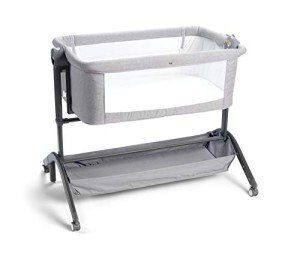Indisputable Proof You Need Bedside Cot For Close Bonding
Bedside Cot for Close Bonding: Enhancing Parent-Child Connection
Intro
The arrival of a newborn is a momentous event that's accompanied by a wealth of joyous feelings and newly found responsibilities. As Our Web Site navigate the myriad of choices they face, one essential factor to consider is where their baby will sleep during those early months. A bedside cot, also called a co-sleeper, has actually become a significantly popular option among caregivers looking for to promote close bonding with their infants while guaranteeing safe sleep practices. This short article explores the advantages of utilizing a bedside cot, its effect on bonding, safe sleeping practices, and important factors to consider for parents or guardians.
- * *
What is a Bedside Cot?
A bedside cot is a kind of crib that is firmly connected to the side of the adult bed, allowing parents to have their newborn close at hand during the night. This setup permits easy availability without having to rise, hence enhancing nighttime feeding and soothing experiences.
Types of Bedside Cots
Attached Co-Sleepers: These designs connect directly to the moms and dad's bed and provide a safe and secure sleeping environment for the infant while preserving easy access for feeding and convenience.
Freestanding Bedside Cots: Operated as a different unit but positioned surrounding to the bed, these cots provide private sleeping areas while still enabling closeness.
Convertible Bedside Cots: These versatile models can adjust as the child grows, changing from a cot to a young child bed or play area, extending their functionality.
- * *
Advantages of a Bedside Cot for Close Bonding
Using a bedside cot not only ensures convenience but also supports an unique bond in between parents and their kids. Here are some essential advantages:
Facilitates Immediate Response: Proximity enables caregivers to react swiftly to the baby's needs, whether for feeding, soothing, or convenience, thereby developing security and trust.
Promotes Breastfeeding: Nighttime breastfeeding becomes much easier when the baby is within reach, helping with a more natural feeding regimen.
Strengthens Emotional Connection: Close physical presence can improve the psychological bond through skin-to-skin contact and mother-infant interactions during nighttime awakenings.
Motivates Sleep Synchronization: Being near each other can assist regulate the infant's sleep patterns to closely line up with those of the parents.
Reduces Sleep Disruption: With the baby nearby, parents may sleep much better, knowing they do not need to leave their bedside to participate in to their baby.
Table 1: Benefits of Using a Bedside Cot
Advantage
Description
Immediate Response
Quick access to the baby for feeding or reassuring.
Promotes Breastfeeding
Easier to breastfeed in the evening due to proximity.
Enhances Emotional Connect
Fosters psychological bonds through regular contact.
Motivates Sleep Synchronization
Helps both parent and baby to establish integrated sleep patterns.
Reduces Sleep Disruption
Decreases nighttime awakenings for parents.
- * *
Safe Sleep Practices
While bedside cots provide numerous advantages, parents should make sure the baby's sleep environment complies with security protocols. Here are some essential security pointers:
- Firm Mattress: Ensure the cot has a company mattress that fits snugly to prevent any gaps where the baby could become caught.
- Sids Prevention: Place the baby on their back to sleep, which pleases the most important suggestion to avoid Sudden Infant Death Syndrome (SIDS).
- Keep Bedding Minimal: Use a fitted sheet and keep other bedding to a minimum to avoid suffocation threats.
- Maintain Distance: Ensure the cot is firmly attached to your bed, reducing the risk of falls.
- Limit Soft Objects: Keep soft toys, pillows, and blankets out of the cot to provide a safe sleeping environment.
Table 2: Safe Sleep Practices for Bedside Cots
Security Tip
Description
Company Mattress
Use a company mattress that fits snugly into the cot.
SIDS Prevention
Constantly place the baby on their back to sleep.
Keep Bedding Minimal
Limit bed linen products to avoid suffocation dangers.
Preserve Distance
Ensure the cot is firmly protected to the adult bed.
Limitation Soft Objects
Get rid of soft toys and pillows from the sleeping location.
- * *
Factors to consider Before Choosing a Bedside Cot
Selecting the right bedside cot needs deliberation and factor to consider of numerous factors:
- Size: Ensure the cot fits comfortably alongside your bed without compromising space.
- Relieve of Use: Look for designs that are user-friendly and easy to operate, specifically throughout nighttime feeding.
- Security Features: Safety straps and locking systems ought to be in location to prevent accidental detachment.
- Material Safety: Choose non-toxic, baby-friendly materials with compliant security requirements.
Regularly Asked Questions (FAQs)
1. Is it safe to use a bedside cot?Yes, bedside cots can be safe when appropriately attached to the adult bed and utilized according to security standards.
2. At what age can I transition my baby to their own room?Generally, health professionals advise transitioning babies to their own room between 6 months to 1 year, however every household scenario may differ.
3. Just how much space does a bedside cot need?Bedside cots vary in size; it's important to make sure adequate space beside your bed for appropriate installation and access.
4. Can a bedside cot be utilized for overnight trips?Some designs are portable and developed for travel, making them suitable for over night journeys or vacations.
5. How do I clean a bedside cot?Describe the maker's guidelines for correct cleansing directions to keep health and security.
- * *
A bedside cot serves as an important tool for fostering close bonding between parents and their infants. By ensuring easy access during nighttime, promoting breastfeeding, and allowing immediate responsiveness, a bedside cot boosts the parent-child relationship throughout those crucial early months. When combined with safe sleep practices, it supplies an environment that nurtures psychological advancement while prioritizing safety. For any new parent, investing in a quality bedside cot can cause a lovely co-sleeping experience full of bonding chances and peaceful nights.
